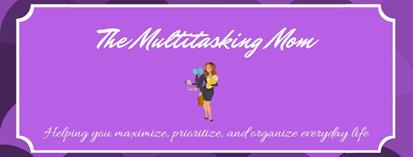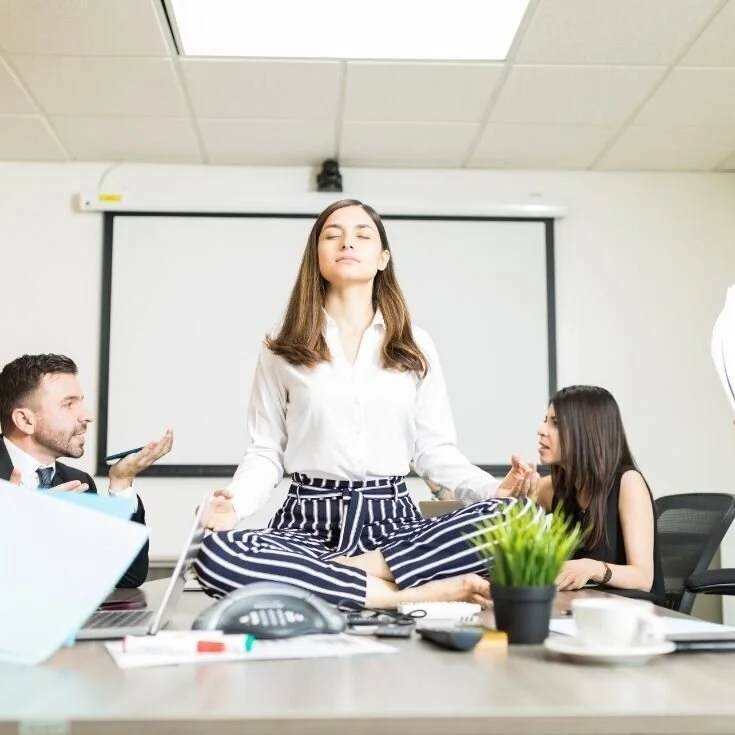Disclaimer: The Multitasking Mom is a participant in the Amazon Services LLC Associates Program, an affiliate advertising program designed to provide a means for us to earn fees by linking to Amazon.com and affiliated sites. Anything linked within this post are items that the author, herself, would purchase and all other content continues to be the author's own opinion.
Sleep is essential to life. I mean there’s a reason why sleep deprivation is used as a form of torture. Everyone needs sleep.
As moms, we sometimes don’t have as much control over the amount of sleep that we get as we would like. I mean, kids wake up in the night or we just need to get a few extra things done before we go to bed.
But just as important as the amount of sleep we get, is the quality of our sleep. There is a lot that we can do to naturally improve the quality of our sleep so that we can get the most bang for whatever amount of sleep we do get.
This will give us the energy to get things done during the day and tackle those goals.
Go To Bed And Wake Up At The Same Time
Having a consistent sleep schedule is a great way to get better sleep. When you go to bed and wake up at the same time each day, your body gets used to the schedule. It knows when bedtime is approaching making it that much easier to go to sleep.
It will also allow you to wake up more easily in the morning and actually feel energized. If you stay consistent you can even stop yourself from needing an alarm clock anymore.
My bedtime is between 10:30 -10:45. My goal is to be asleep by 11. This gives me a solid 7 hours of sleep before I wake up at 6. When I was breastfeeding, I would go to bed around 10 to account for the time I was up feeding the baby at night.
Even now, if the kids wake me up during the night, I will allow myself to sleep in a bit in the morning.
Separate Your Spaces - Don’t Work In Bed
When you work in the place same that you sleep, you will start associating that place with work. If at all possible, I try not to work in the bedroom. Your bedroom should be a place of calm and relaxation; an oasis.
If you have your laptop in there, it’s too easy to try to just get one more thing done. Or to have it’s presence remind you of the work you haven’t done yet and create a stressful environment.
Play it safe and keep work out of the bedroom.
End Screen Time 1 Hour Before Bed
The blue lights from our screens and digital devices can actually cause our bodies to think it is daytime and disrupt our sleep. The blue light that's emitted from these screens can delay the release of sleep-inducing melatonin, increase alertness, and reset the body's internal clock to a later schedule.
In fact, a Dutch study recently showed that those who use their devices frequently, especially in the evening can reduce their ability to reach deep sleep by 30 minutes and they have more sleep disruptions during the night.
Cutting off screen time 1-2 hours before bed can make a real difference in improving our ability to get deep restorative sleep.
4. If You Can’t Cut Off Screen Time, Use Blue Light Blocking Glasses
But sometimes that just isn’t possible. Sometimes you just have to get some work done in the evening, or you just want to unwind by watching that movie or TV show. That’s where blue light blocking glasses come in.
These are glasses with special lenses that block blue light from reaching your eyes. The creme de la creme are Swannies which can cost a pretty penny. If you are on more of a budget, you can get this pair from Prospek.
These glasses are actually looking more and more fashionable with cooler frames and lens shapes. So, you don’t have to feel like a dork while protecting your eyes and your sleep.
5. Apply Topical Magnesium
Magnesium is an essential element for more than 300 biochemical reactions in the body. At the same time, up to 50% of the population is deficient in magnesium. That means that 50% of people’s bodies can’t function efficiently because they don’t have enough magnesium.
One of the many things that magnesium helps, is sleep. Magnesium helps you relax in the evening, fall asleep faster, and sleep better throughout the night as it improves your blood circulation.
While it is possible to supplement magnesium orally, dosages can be tricky. Too much magnesium in your digestive system can give you the runs. Topical magnesium however does not have that same issue. You get the benefits of the additional magnesium without the potty pants.
Because of this, I love Ease Magnesium Spray . It is a good quality, pure magnesium spray that goes on smoothly and doesn’t make you feel sticky. I apply it in the evening to help me get a better night’s sleep.
6. Cut Off Coffee by Noon
We all know that caffeine keeps you up. Any time we need a boost of energy our hand automatically reaches out for that coffee cup. But do you know how long that caffeine stays in your body?
In humans, the half-life for caffeine is anywhere from 4 to 6 hours on average. That means that after 4-6 hours, 50% of the caffeine you ingested is still in your body. So if you drink coffee at 4 pm, by 9 pm your body still has about half of that caffeine circulating through your body.
It’s no wonder you have a harder time falling asleep when you drink coffee later in the day! Having a noon cutoff for all highly caffeinated products can make a huge difference in your sleep.
7. Darken Your Room
Your body is programmed to sleep when it's dark. You can therefore encourage that rhythm by easing your body into bedtime. Dim the lights while you get ready for bed, or turn off bright overhead lights and switch to a soft, bedside lamp.
As discussed earlier, light inhibits the secretion of melatonin, a hormone that naturally promotes sleep. "Even if you doze off, light can be detected through your eyelids—and your brain won't produce melatonin if it's confused between night and day," says Joyce Walsleben, PhD, associate professor at the New York University School of Medicine.
That means that when you fall asleep in front of the TV, you aren’t really getting good quality sleep. The same goes for have super bright digital clocks in the bedroom.
Turn digital clocks and glowing electronics so that they don’t face you in bed. Instead of turning on overhead lights, put a nightlight in your hallway or bathroom in case nature calls at 2 am. If street lights or moonlight shines in from outside, consider installing heavy curtains or wearing a sleep mask.
A few bonus tips from DubLabs
8. Exercise
You may not realize it, but exercise actually has an impact on your sleep. It has been shown that moderate aerobic exercise increases the amount of deep sleep you get. This is when the brain and body has a chance to rejuvenate. Exercise can also help to stabilize your mood and decompress the mind, “a cognitive process that is important for naturally transitioning to sleep,” says Gamaldo.
One thing to keep in mind though is the timing of your exercise. Some people find that exercising too close to bed can increase their endorphins and your body temperature which actually makes it harder for your body to sleep.
The best thing to do is about 30 minutes of moderate aerobic activity any time of day, but at least 2 hours before bed. This will increase your deep sleep while giving your body enough time to recover and fall asleep more easily.
9. Drink Chamomile Tea
Since we can’t drink coffee or caffeinated teas in the evening, what can we drink? Well one great option is Chamomile tea. For years, chamomile tea has been used as a natural remedy to reduce inflammation, decrease anxiety and treat insomnia.
In fact, there have been numerous studies of many different populations including postpartum moms, the elderly, and others which show that chamomile can improve the ability to fall asleep as well as the quality of that sleep.
I love the organic chamomile tea from Yogi Tea.
10. Try Sleep Inducing Essential Oils
Essential oils are another great way to improve the quality of your sleep. Everyone has experienced the joy of smelling cookies fresh from the oven. When we smell something, our olfactory nerve sends signals directly to our limbic system and amygdala, the parts of our brain responsible for our memory and mood.
Therefore, aromatherapy is a great way to heal the mind, body, and soul. This is where essential oils can come in to improve your ability to relax and fall asleep. For example, a 2010 study found that smelling jasmine was just as effective at calming the nerves as a sleeping pill or sedative, but didn’t have any of the adverse side effects.
Jasmine isn’t the only sleep improving essential oil however. There are several essential oils that are known to improve sleep.
Lavender Essential Oil by Plant Therapy
Valerian Essential Oil by Healing Solutions
Clary Sage Essential Oil by Plant Therapy
Sweet Marjoram Essential Oil by Healing Solutions
11. Journal Your Thoughts
Journaling is a great way to put the stress of your day behind you. If you often find yourself lying in bed with thoughts running through your head, this can be a great way to put a period on your day and stop the stress.
One option is to use a blank journal which gives you the space to write down any thoughts or ideas that come to you. Some people love this whereas others find the blank page intimidating.
Another option is use a prompted journal like my Mom Life Journal. This book gives you a few simple prompts each morning and evening to start your day with gratitude and end your day with reflection.
Getting your thoughts down on paper can make a huge difference in your ability to fall asleep and stay asleep.
12. Get The Right Bedding
If you have been sleeping on cotton sheets, then you need to get yourself some Eucalyptus Lyocell sheets. The benefits of these sheets to yourself and the environment will amaze you.
My favorite ones are from Sheets & Giggles. Their 100% eucalyptus lyocell sheets are made from trees grown on sustainably managed plantations. They are eco-friendly and don’t require the pesticides that are used to grow cotton. So they are naturally chemical free sheets.
Now as far as your sleep is concerned, these sheets are naturally softer, more breathable, and more moisture-wicking than cotton bed sheets. This allows your body to stay at the optimal temperature for sleep. Plus, they're hypoallergenic, zero static, and self-cooling.
13. Read Sleep Smarter
These tips are great and can truly help you get a better night’s sleep. But if you really want to dive into the science behind why you need great sleep and learn a ton more ways you can improve your sleep, then you need to check out the book Sleep Smarter by Shawn Stevenson.
Shawn is like your neighborhood guy breaking down the science and benefits of great sleep. Plus, he has a bazillion ways you can use to improve your sleep. It’s truly amazing information broken down into an easy to understand book. It even comes with a 14 day plan to get better sleep.
If this stuff intrigues you, or you are really struggling with your sleep, then this is the book to check out.
Sleep is so essential to our mental, physical and basically our overall health. Without it, we can’t possibly live our best lives. These tips are simple things you can do to naturally improve your ability to fall asleep and get quality sleep.
Which will you try first? Let me know in the comments!
Cheers,
Emily





















